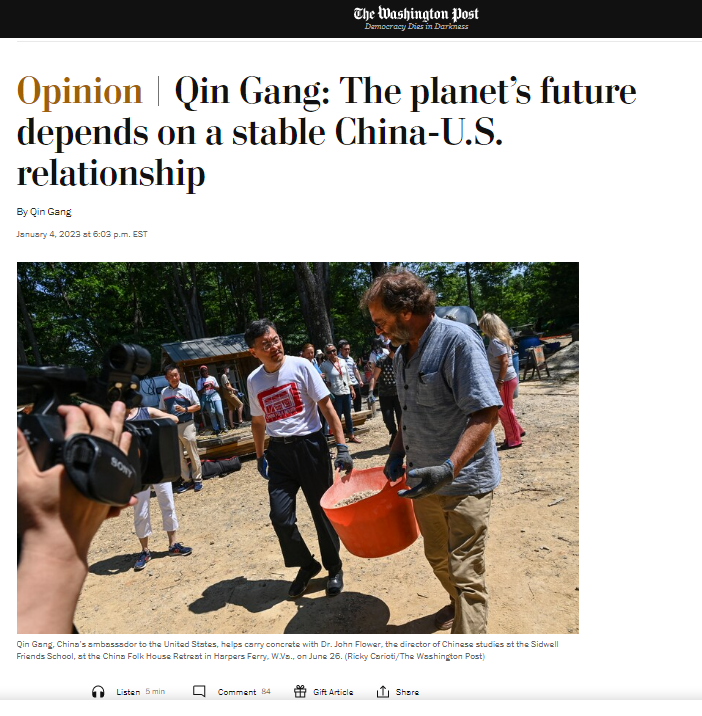
1月4日,中国外交部长秦刚大使在美国《华盛顿邮报》发表题为《稳定的中美关系攸关我们星球的前途命运》的署名文章。全文译文如下(来自中国驻美大使馆网站):
美国诗人艾略特曾经写道,终点即是我们的起点。我于本周离开美国,开始人生新征程,然而时时萦绕在我脑海里的仍然是在美工作生活的幅幅画面。
我走访了美国22个州,发现了华盛顿之外不一样的美国。在播撒希望的春天里,我到访习近平主席2012年曾访问过的艾奥瓦州金伯利农场,试驾农业拖拉机,品尝当地农产品。在收获果实的秋天里,我又走进密苏里州大豆和玉米农场田间地头,在那里,美国农民的质朴和好客深深打动了我,我也感受到中美农业合作不仅有利于两国,也有利于减少全球粮食供应的不稳定性和应对全球气候变化。在明尼阿波利斯市的沉浸式中文学校,我客串了一把中文老师,该校一名学生最近还获得“汉语桥”世界小学生中文秀全球总冠军。在俄亥俄和加州的工厂里,美国工人告诉我这些中国投资的企业为他们创造了就业,他们及其家人的生活有了可靠保障。在加州长滩港和马萨诸塞州波士顿港,我看到了堆积如山的往来中美的集装箱,切身体会到中美经贸高度依存,“脱钩断链”并不符合任何一方利益。在圣路易斯市红雀队主场,我为棒球比赛开球,纪念南京和圣路易斯建立第一对中美友好城市43周年。我还与美国朋友们一起庆祝大熊猫抵美50周年。
这样美好、生动的场景还有很多很多。驻美经历是我作为一名外交官的难忘记忆,也将是我一生的宝贵财富。在新的岗位上,推动中美关系发展仍将是我的重要使命之一。
在我赴任中国驻美大使之时,中美关系面临复杂困难局面,两国对话交流机制几乎全部中断停摆,中国企业被无理制裁打压,加上疫情的影响,双方人文交流受到严重阻碍。中国常被视为美“最严峻竞争者”。
作为驻美大使,我的使命就是促进中美各领域交流合作,努力推动双边关系稳定、改善和发展。推进关系需要双方共同努力。我与美联邦政府官员坦诚沟通,保持顺畅的工作关系,妥善处理包括台湾问题在内的棘手难题,推动重要领域交往合作取得进展。我与80多位美国会参众议员会面晤谈,相互倾听、表达各自的立场和关切,哪怕对方是知名的对华“鹰派”。我与美战略界深入交流,希望共同思考、推动重构一个稳定、可预期、建设性的中美关系框架。我广泛会见美工商界代表,深切感受到他们对中国市场的信心和对华合作的愿望。我造访美国各大学,并帮助因疫情受阻的美国学生回到中国。我多次接受美国媒体采访,虽然时有交锋,但我感谢他们愿意倾听中国大使的声音,了解中方的立场和主张。
我坚信,中美关系的大门已经打开,就不会关上。我也坚信,美国人民和中国人民一样,都是心胸宽广、勤劳友善的人民,而一个健康稳定的中美关系攸关两国人民和我们星球的前途命运。中美关系不应该是你输我赢、你兴我衰的零和博弈,宽广的地球足够容下中国和美国各自发展、共同繁荣。中美各自取得成功对彼此是机遇而非挑战。我们不能让偏见和错误的认知导致两国伟大人民之间的对抗冲突。双方应在两国元首的战略指引下,找到有利于维护世界和平繁荣的正确相处之道。
这并非坦途,需要中美两国各界共同不懈努力,但历史将证明我们今天的努力和付出是必须而且值得的。
回国之际,我将珍藏在美的珍贵回忆。诗人艾略特还曾写道,抵达终点意味着新的出发。我相信,中美关系也终将回归正途并不断前行。
以下为英文原文,来自华盛顿邮报。
Qin Gang, the Chinese ambassador to the United States, was appointed China’s minister of foreign affairs on Dec. 30.
“The end,” wrote the poet T.S. Eliot, “is where we start from.” As I leave the United States this week to start a new journey, memorable scenes from my time in this country keep flashing back in my mind.
Sign up for a weekly roundup of thought-provoking ideas and debates
I visited 22 states and discovered a country different from what I know in Washington, D.C. In the spring, I visited the Kimberley Farm in Iowa, which President Xi Jinping visited in 2012. I tried my hand at driving a John Deere tractor and tasted the local produce. In the fall, I visited a corn and soybean farm in Missouri and was deeply moved by my hosts’ sincerity and hospitality.
I saw with my own eyes how Chinese-American agricultural cooperation benefited both countries and contributed to both the global food supply and the fight against climate change. In Minneapolis, I taught a class to kids in a Chinese language immersion school, and one of the students there just won the Chinese Bridge language competition. I visited Chinese-owned factories in Ohio and California, as American workers explained that Chinese investments helped to put food on their tables. At the ports of Boston and Long Beach, I saw huge stacks of containers shipped from and to China, a testament to the high degree of economic interdependence between our two countries — and a reminder that decoupling serves no one’s interest.
At Busch Stadium in St. Louis, I threw out the first pitch at a Cardinals game to celebrate the 43rd anniversary of Nanjing-St. Louis sister-city relations, our two countries’ oldest such pairing. I celebrated, together with American friends, the 50th anniversary of the giant pandas’ arrival in the United States.
These are, for me, important memories about this country, and I will hold them in my heart. My posting in the United States will provide unfailing strength for me as a diplomat. Going forward, the development of China-U.S. relations will remain an important mission of mine in my new position.
I became ambassador to the United States at a complex and difficult time for China-U.S. relations. Almost all of the dialogue and exchange mechanisms were suspended. Chinese enterprises were unfairly sanctioned. Compounded by the pandemic, people-to-people exchanges were severely impacted. China was often described as America’s “most serious competitor.”
As ambassador, I took it as my mission to promote exchanges and cooperation in various fields, and work for the stability, improvement and development of China-U.S. relations. Improving relations takes work by both sides. I had candid dialogue and built sound working relations with U.S. government officials to properly handle thorny issues, such as the Taiwan question, and to advance cooperation in important areas.
I met with more than 80 members of Congress, including some well-known China hawks, to explain China’s positions and concerns, while lending an ear to theirs as well. I explored with think tanks on how to rebuild a stable, predictable and constructive framework for bilateral relations. I was encouraged by the business community’s confidence in the Chinese market and its strong desire for continued cooperation. I visited many American universities, and helped U.S. students who were kept from going to China because of the pandemic return to their Chinese campuses. I did many interviews with American media. Though we did not always see eye to eye, I appreciated their readiness to listen to the Chinese perspective.
I leave the United States more convinced that the door to China-U.S. relations will remain open and cannot be closed. I am also more convinced that Americans, just like the Chinese people, are broad-minded, friendly and hard-working. The future of both our peoples — indeed, the future of the entire planet — depends on a healthy and stable China-U.S. relationship.
My time here also reminds me that China-U.S. relations should not be a zero-sum game in which one side out-competes the other or one nation thrives at the expense of the other. The world is wide enough for China and the United States to both develop and prosper. The successes of our two countries are shared opportunities, not winner-take-all challenges. We must not allow prejudice or misperception to ignite confrontation or conflict between two great peoples. We should follow the strategic guidance of our presidents and find the right way to get along for the well-being of the world.
This will not be, as Americans sometimes say, a “walk in the park.” It requires the persistent efforts of everyone. However, history will prove that what we have begun is essential and worthwhile.
I will take all these memories with me when I go back. The poet Eliot also wrote, “To make an end is to make a beginning.” I believe that the relations between our countries will follow that path.


